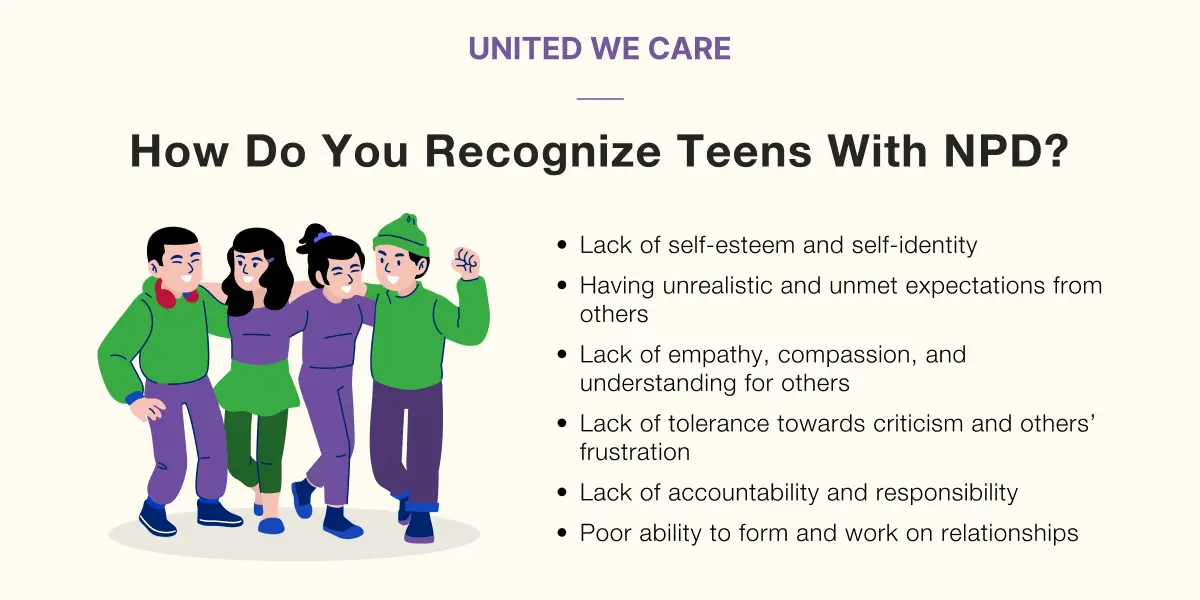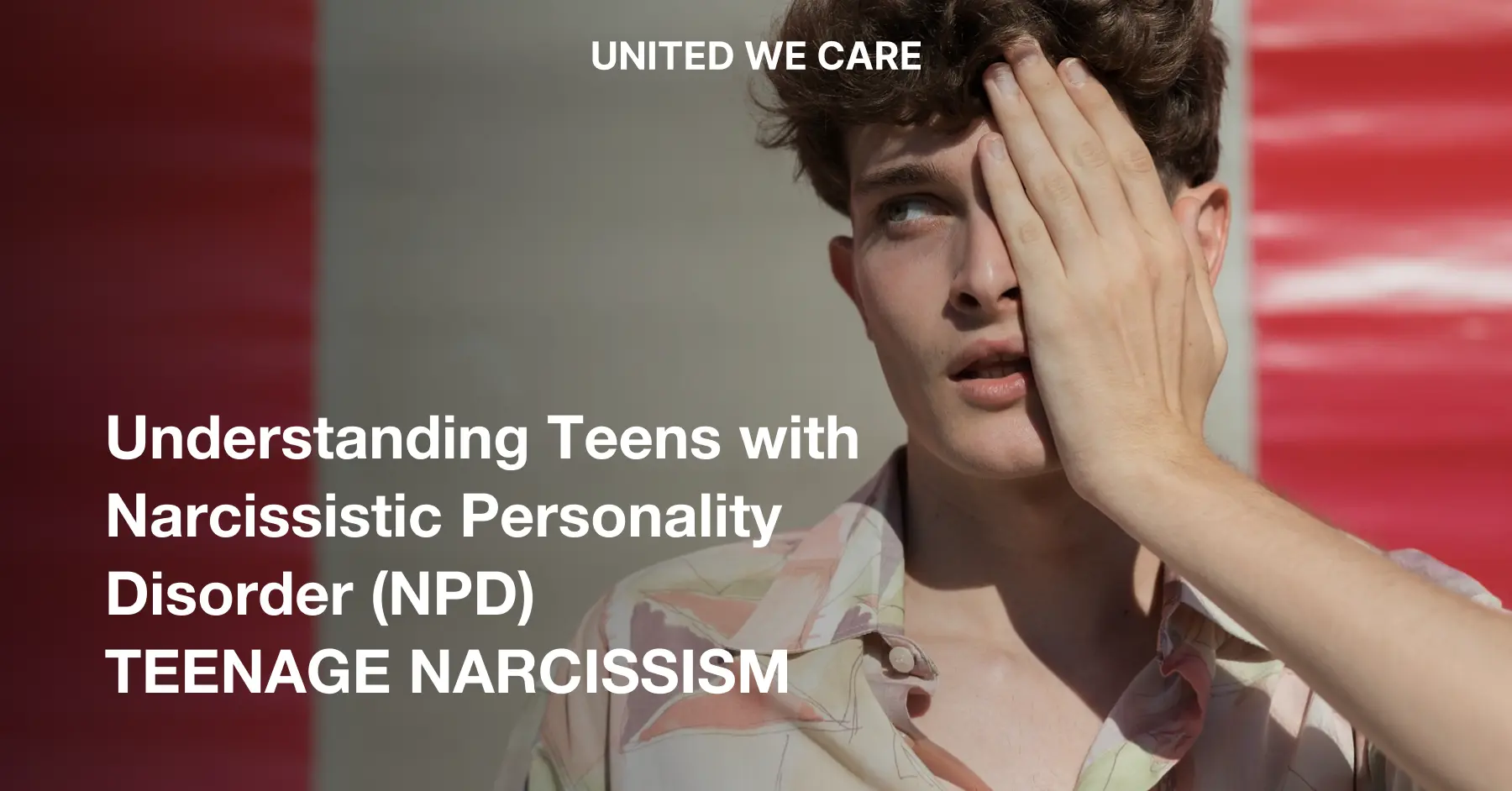Introduction
A mental health constraint in which people feel the constant need for attention is known to be a narcissistic personality. Along with this, they have a sense of their own importance. This disorder has been noticed a lot lately in the teenage or early adulthood age group. Let’s analyze its causes, effects, and prevention further.
What is Narcissistic Personality Disorder in teens
Do most teenagers have NPD? Narcissistic personality disorder, or NPD, is a psychological disorder characterized by symptoms related to high self-importance, entitlement, and poor empathy. Now, most teenagers seem to display such traits every now and then; are they actually suffering from this personality disorder?
Mental health professionals recognize that it is a part of the transition of teenhood to become a little self-centered. This is a natural change brought by development because adolescents are in the segue between being dependent children and independent adults.
Naturally, one must experience an omnipotent sense of self to detach from a parental figure. Understandably, this can be a bit tricky as teenagers don’t have much life experience but need to start trusting their own inner voice.
Consequently, they experience what researchers call a refusal to acknowledge shortcomings and vulnerability, projection of disowned self-experiences onto others, and demands for public affirmation of their power [1].
It is important to note that this level of narcissism is not only healthy but expected during this life stage. However, it can turn pathological if there are elements of exhibitionism, ruthlessness, and persistent self-victimization involved. Simply put, if a teen’s mood swings and narcissism starts to impair their ability to function, it could lead to NPD.
Symptoms of Narcissistic Personality Disorder in teens
In order to diagnose oneself with teenage narcissism, one must first look for signs and symptoms. Moreover, these symptoms usually serve as proof at the time of diagnosis. In addition to this, having noticed the symptoms helps to treat them better as well. Some of them are as follows:
- Lack of empathetic nature
- Thinking of themselves are superior to others
- Hints of jealousy against others
- Inability to take any kind of criticism
- No respect for personal boundaries
- Practicing manipulation toward others
As these are some common ones to look out for, it helps to learn about one’s NPD and treat it right. Some other symptoms focused on teens would be:
- Being busy with fantasies of their desires
- Thinking of themselves as unique
- Not feeling understood by people who aren’t as special as them
- Impatient in nature when not recognized
- Presenting anger when they don’t get what they want
The main cause of Narcissistic Personality Disorder among teens
To treat NPD for the better, it should be noted that it is important to understand the cause behind it. Unlike other mental health conditions, the exact reason for NPD in teens is yet unrecognized. However, it is definitely due to a combination of genetic, biological, psychological, and environmental factors.
Some cases might be a possibility of the cause of NPD, such as:
- Genetically, as if somebody else in the family has a history of NPD in the past.
- A need for external validation developed from being ignored as a child by neglected or absent parents.
- Affected parts of the brain are reliable for empathy, control, and emotion regulation due to an injury or abnormality.
- Influence of the environment created through peers, media, and other sources.
Hence, these are some of the possible causes through which a person might develop NPD values and behaviors.
How do you recognize teens with Narcissistic Personality Disorder
As teenage narcissism might overlap with symptoms of adolescent behaviors, it might be hard to acknowledge. As we grow up, certain behavioral patterns are only an influence of nature and not a sign of any mental health disorder. However, this might affect the diagnosis when there’s an issue. Furthermore, this leads to a delay in the treatment of it. Since it is still important to recognize it to make the mental health condition better, common symptoms are reliable. Teenage narcissism attacks people of a similar history, their tolerance of external influences, and other factors related to one’s moods.

Some of the following are the signs that appear in teens with NPD, such as:
- Lack of self-esteem and self-identity
- Having unrealistic and unmet expectations from others
- Lack of empathy, compassion, and understanding for others
- Lack of tolerance towards criticism and others’ frustration
- Lack of accountability and responsibility
- Poor ability to form and work on relationships
Effective parenting style for teens with Narcissistic Personality Disorder
Teenage narcissism affects not only the life of the teen going through it but also the family members around them. Importantly, parents are held accountable at the time of treatment and diagnosis. Apart from this, it is also stressful for the parents to decide on a parenting style in order to help the suffering child. Furthermore, it is worsened by the teen’s lack of willingness when it comes to changing their behavior or asking for help.
But a few steps that parents can take might be an effective way to deal with the teens as the following:
- Stating particular rules and boundaries to be followed along with strict consequences
- Provoking them with a healthy relationship with empathy, understanding and other social skills
- Presenting a healthy way to feel and express emotions and opinions while being a patient listener
- Seeking help from a professional through United We Care while normalizing the same in the patient’s environment.
Conclusion
As per the discussion above, it is important to acknowledge that teenage narcissism is very prevalent and serious these days. It affects the way one deals with one’s feelings, thoughts, and behaviors. It definitely has a negative impact on the lives of the patients along with the people around them. Besides, it shapes the teen’s relationships with others in a different manner than those of peers without NPD.
However, it can importantly be treated by developing a realistic image of the reality aligning with one’s idea of oneself. This treatment of the disorder actually leads to better daily functioning and improved bonds in relationships. Not only this, but also, as parents are highly affected, it is important for them to adopt a better parenting style. Hence, small steps towards helping the patient get through it are helpful. Along with this, the patient being able to look at things from a general point of view can help with NPD.
References
Bleiberg, E., 1994. Normal and pathological narcissism in adolescence. American Journal of Psychotherapy, 48(1), pp.30-51.
- [2] Lapsley, D.K. and Stey, P.C., 2012. Adolescent narcissism. Encyclopedia of adolescence, pp.231-281
- [3] Links PS, Gould B, Ratnayake R. Assessing Suicidal Youth with Antisocial, Borderline, or Narcissistic Personality Disorder. The Canadian Journal of Psychiatry. 2003;48(5):301-310. doi:10.1177/070674370304800505
- Bunker, L.N. and Gwalani, M., 2018. Narcissism, body-esteem and selfie-taking behaviour among teens and adolescents. International Journal of Research and Analytical Reviews, 5(3), pp.391-395.
- Kurniasari, C.I., 2023. Factors Affecting Adolescent Coping with Narcissistic Personality: Literature Review. Indonesian Journal of Global Health Research, 5(2), pp.257-264.









